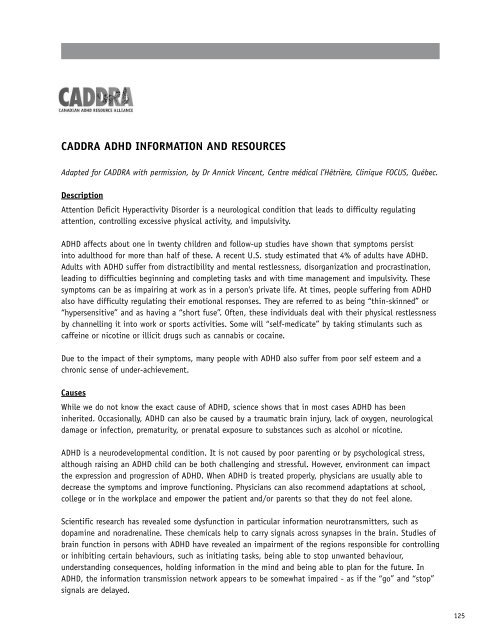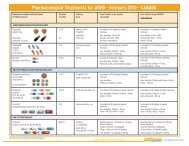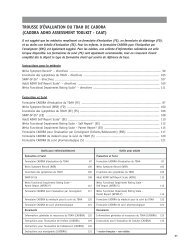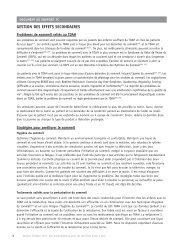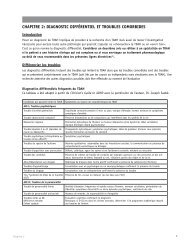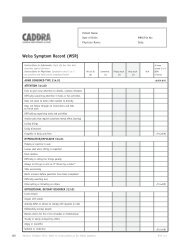CADDRA ADHD ASSESSMENT TOOLkIT (CAAT) FORMS
CADDRA ADHD ASSESSMENT TOOLkIT (CAAT) FORMS
CADDRA ADHD ASSESSMENT TOOLkIT (CAAT) FORMS
You also want an ePaper? Increase the reach of your titles
YUMPU automatically turns print PDFs into web optimized ePapers that Google loves.
<strong>CADDRA</strong> <strong>ADHD</strong> INFORMATION AND RESOuRCES<br />
Adapted for <strong>CADDRA</strong> with permission, by Dr Annick Vincent, Centre médical l’Hêtrière, Clinique FOCUS, Québec.<br />
Description<br />
Attention Deficit Hyperactivity Disorder is a neurological condition that leads to difficulty regulating<br />
attention, controlling excessive physical activity, and impulsivity.<br />
<strong>ADHD</strong> affects about one in twenty children and follow-up studies have shown that symptoms persist<br />
into adulthood for more than half of these. A recent U.S. study estimated that 4% of adults have <strong>ADHD</strong>.<br />
Adults with <strong>ADHD</strong> suffer from distractibility and mental restlessness, disorganization and procrastination,<br />
leading to difficulties beginning and completing tasks and with time management and impulsivity. These<br />
symptoms can be as impairing at work as in a person's private life. At times, people suffering from <strong>ADHD</strong><br />
also have difficulty regulating their emotional responses. They are referred to as being “thin-skinned” or<br />
“hypersensitive” and as having a “short fuse”. Often, these individuals deal with their physical restlessness<br />
by channelling it into work or sports activities. Some will “self-medicate” by taking stimulants such as<br />
caffeine or nicotine or illicit drugs such as cannabis or cocaine.<br />
Due to the impact of their symptoms, many people with <strong>ADHD</strong> also suffer from poor self esteem and a<br />
chronic sense of under-achievement.<br />
Causes<br />
While we do not know the exact cause of <strong>ADHD</strong>, science shows that in most cases <strong>ADHD</strong> has been<br />
inherited. Occasionally, <strong>ADHD</strong> can also be caused by a traumatic brain injury, lack of oxygen, neurological<br />
damage or infection, prematurity, or prenatal exposure to substances such as alcohol or nicotine.<br />
<strong>ADHD</strong> is a neurodevelopmental condition. It is not caused by poor parenting or by psychological stress,<br />
although raising an <strong>ADHD</strong> child can be both challenging and stressful. However, environment can impact<br />
the expression and progression of <strong>ADHD</strong>. When <strong>ADHD</strong> is treated properly, physicians are usually able to<br />
decrease the symptoms and improve functioning. Physicians can also recommend adaptations at school,<br />
college or in the workplace and empower the patient and/or parents so that they do not feel alone.<br />
Scientific research has revealed some dysfunction in particular information neurotransmitters, such as<br />
dopamine and noradrenaline. These chemicals help to carry signals across synapses in the brain. Studies of<br />
brain function in persons with <strong>ADHD</strong> have revealed an impairment of the regions responsible for controlling<br />
or inhibiting certain behaviours, such as initiating tasks, being able to stop unwanted behaviour,<br />
understanding consequences, holding information in the mind and being able to plan for the future. In<br />
<strong>ADHD</strong>, the information transmission network appears to be somewhat impaired - as if the “go” and “stop”<br />
signals are delayed.<br />
125


